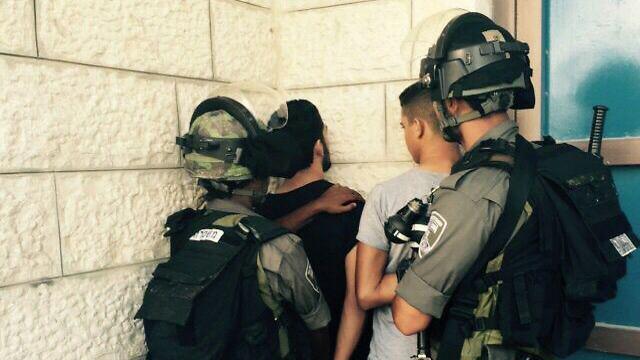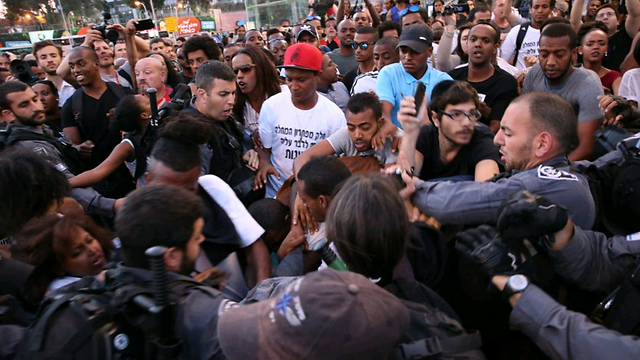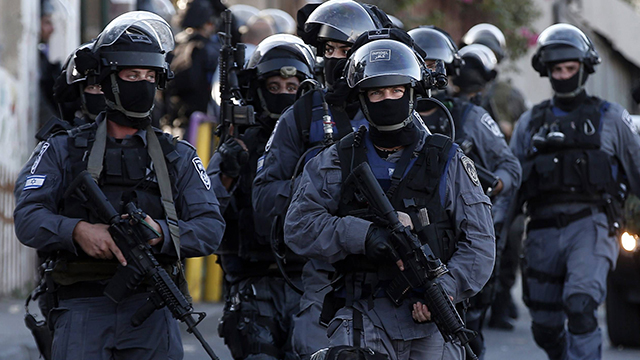
Report points to an increase in human rights violations in Israel
The Association for Civil Rights in Israel released its annual report on the state of human rights in the country on Thursday, to coincide with International Human Rights Day. Among its findings were increased use of administrative detention and harm to freedom of expression.
For the first time this year, Israel has placed Jewish minors in administrative detention, according to a report by the Association for Civil Rights in Israel (ACRI) released on Thursday.
According to the report, 54 Jews received administrative orders banning them from the West Bank over the past year, while 62 Palestinians received similar orders banning them from Jerusalem, the Old City, or the Temple Mount.

In light of the escalating security situation, the government approved in October a "stop and frisk" bill proposal, allowing police to conduct physical searches without probable cause.
The report noted that "the trend of violating the rights for personal security, physical integrity, a fair trial and the freedom of expression, which started during Operation Protective Edge, has worsened considerably during the wave of violence that started in September."
ACRI warns of a worrying trend in its report: The violation of human rights has increased and methods previously only used in the West Bank have been adopted in Israel and in East Jerusalem, hurting more and more population groups.
Among these methods are administrative detentions and restraining orders which, the report states, serve as a way to bypass the regular criminal process, limiting human freedoms without a fair trial and without due process.
ACRI also chided statements from politicians and senior police officials who called on civilians to arm themselves and shoot to kill, saying this increased the amount of shootings that contravened the rules of engagement, some of which also claimed innocent lives.
The report accuses police in East Jerusalem of using "excessive force," saying it resulted in the wounding of passersby - both children and adults.
ACRI also condemned the continued use of "skunk" - a malodorant, non-lethal weapon used by Israeli forces for crowd control, saying there are testimonies to the fact that police used it against Israeli Ethiopians during their protests in May, as well as in protests in Arab cities and towns. Spraying the liquid, which has a very strong odor, is at times done into houses or directly at protesters in violation of procedures, the report stated.
"It is the government and the Knesset's duty to take effective measures in order to deal with the violent incidents that have claimed lives, sowed fear, and disrupted everyday life. However, they must do so without deviating from the principles of criminal law and while taking human rights into account. Such decisions, made hastily and in the heat of the moment, might remain even after the security situation has calmed down, and continue to erode our values," said ACRI executive director attorney Sharon Abraham-Weiss.

ACRI also pointed to a concerning trend in the violation of the freedom of expression as well, noting that over the past year there have been several attacks from senior ministers on political and artistic freedom of expression. Education Minister Naftali Bennett decided schools will no longer take students to see the play "A Parallel Time," based on the story of a Palestinian prisoner convicted of murdering an IDF soldier. In addition, Culture Minister Miri Regev worked to cut the funding for Al Midan theater in Haifa, which put on the play.
Regev also announced that she would examine the financial support for several other cultural institutions because of their film and play programs, and requested to change the criteria for funding these entities because of "incitement, harm to state symbols and encouragement of terror." The Haifa, Be'er Sheva, Jerusalem and Yeruham municipalities also restricted artistic freedom of speech following controversial political issues.
ACRI's report nonetheless pointed to several positive government initiatives that advanced socioeconomic rights. The Knesset barred the disconnection of people's water supply in the event that they are unable to pay for it. The government also marginally improved the situation of those with debts to state insitutions, child allowance increased slightly and an agreement was reached to absorb thousands of contract workers into direct employment.
Despite the progress, however, each area of society remains in need of dramatic improvements in order to safeguard human and civil rights. Those in debt, for example, do not receive adequate protection. The way in which the debt collection system operates makes it difficult for them to escape the cycle of debt and poverty.
Furthermore, the debt collection system is not uniform; most of those in debt do not have legal representation; certain state bodies have the authority to use draconian collection methods; and those in debt are denied due process and the opportunity to restructure their debt.
The Israel Electric Company can still disconnect electricity in the event of unpaid bills, despite it being an essential service and without needing to check who it is they are cutting off. Subsequently there is no oversight of whether disconnecting the electricity is liable to cause any particular damage to the individual or household.
The IEC still has not published the rules governing disconnections, despite being legally obligated to do so. Every year more than 40,000 households have their electricity cut off.











